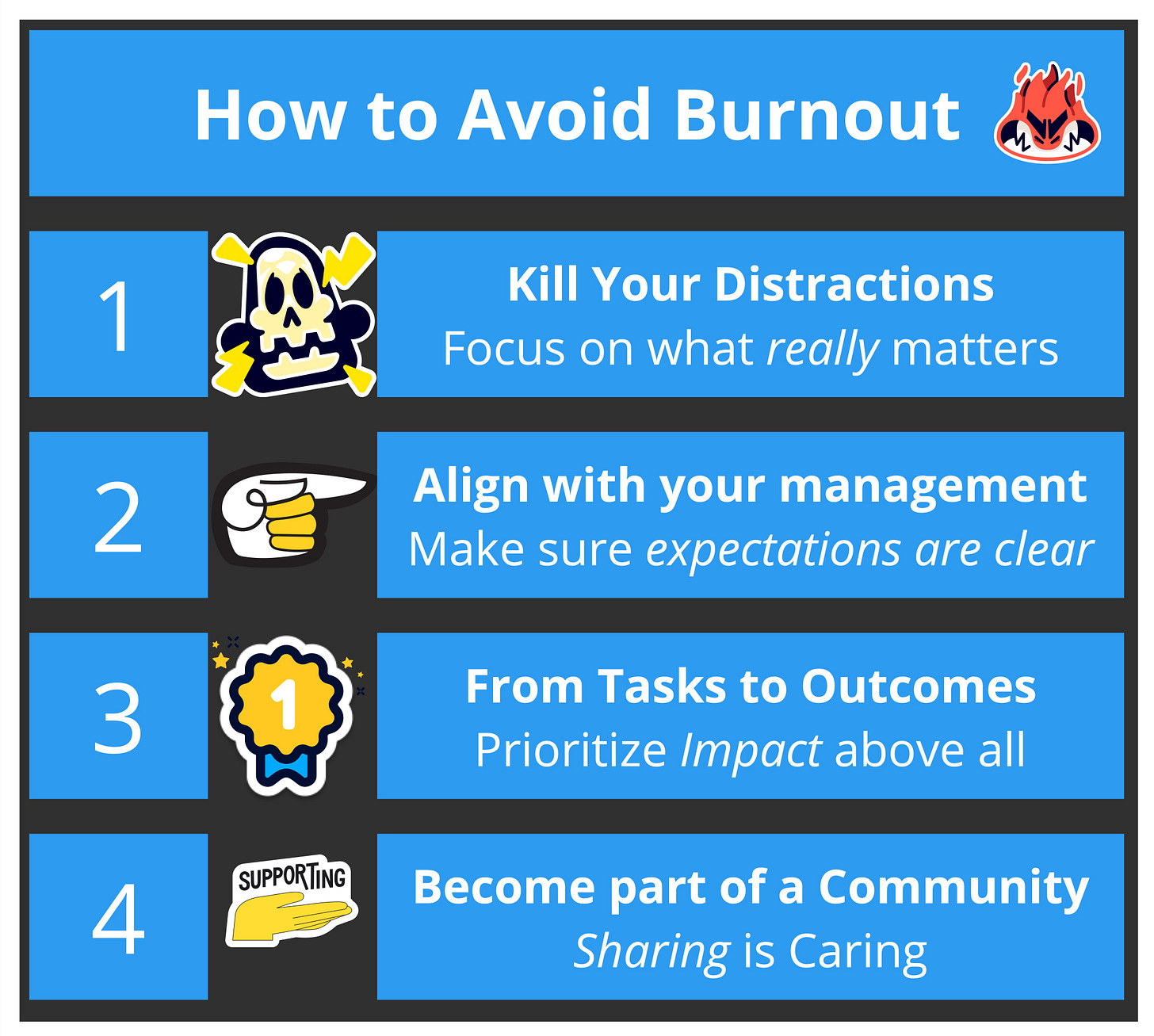14. How to avoid burn-out as a Product Manager
A fiery passion for your work is great until you get burned 🔥
Welcome! I’m Vincent and this is a Product Manager’s Notebook, a series of notes for people who are interested in sharing and learning the art of product management and career development. You can read my archive here.
If you appreciate reading this post, please consider liking and subscribing.
This post was first featured as my first guest post for Product Voyagers at the beginning of the year.
Please go and check them out!
It happened again
I woke up again that night, covered in sweat.
Oh no, I’d forgotten to send that email.
Somewhere in the back of my mind, I realised my jaw muscles were tightly clenched.
I’ve probably been grinding my teeth again. My dentist only recently reminded me that was a problem.
As my mind began to race, I started to think about the 20 things on my to do list for that week. Out of the 20, 14 were labeled “important” which meant they needed to be done immediately. 5 were labeled “critical”, which meant an even higher level of urgency because of senior management attention.
How am I going to get this done?
How did I get here?
When I first started my PM career, I found myself owning one of the most heavily used products in the company with hundreds of thousands of unique monthly active users. A few personnel changes later, I became the sole PM responsible for leading 5 dedicated engineering teams.
28 engineers asking for decisions on prioritisation, design elements, testing, agreements with other product teams, and roll-out plans. Topics varied across legal questions, commercials, platform stability, tech migrations, and designing a brand new user experience. A 6-week PI cycle meant endless PI planning, clarifying requirements, negotiating story points, managing agile ceremonies, and repeat.
Then came the other two products that I also came to manage.
The more mature Enterprise product that needed a comprehensive GTM strategy for our new capabilities including Cloud. The new Enterprise product where frustration was growing as quickly as its revenue because of an ever-expanding backlog of issues that needed to be addressed and a complicated tech stack no-one appeared to fully understand.
I constantly asked myself:
“How am I going to do it all?” and “if I don't do it, who will?"
Becoming a PM was my career long goal, one that I had fought long and hard to get to (I covered this in my lessons on failure). Here I was, 6 months into my new dream job, looking after three products. However, for the first time in my career, I was starting to feel dread for the morning. I felt like I was spinning 20 plates, waiting for one to come crashing down. Probably my mental state.
Overwhelmed. Stressed. Drowning in priorities. I realised I was heading towards burn out.
Why was this happening?
“I’ve never felt so stressed in my life and I’m absolutely miserable”, another new PM candidly shared with me this year. He’s not alone.
Burn out is an increasing issue for people who work in Product. When Mind the Product made a quick poll in 2020, over 80% of respondents said they had had or were currently experiencing a burn out. A 2024 Payscale survey finds a senior manager being the top job people want to quit.
Being a product manager is one of the loneliest jobs in tech, and the stress builds up due to many reasons including:
A lack of organisational support and resources to help PMs to succeed
A lack of direct control over the outcomes, with no authority and dependencies on other groups who have conflicting priorities
Constant context-switching as you bounce between topics throughout the day, from creating your product vision and strategy, to sales opportunities, to customer support etc.
Unrelenting pressure to deliver from all sides: management, sales, support and customers
Lack of visibility: You get the blame for when things go wrong, and not the credit when things go well
Unclear/shifting targets: What’s our strategy? Pivot! The shifting goal posts can make it really frustrating to get a sense of achievement.
Imposter syndrome, as PMs are often generalists working with specialists and subject matter experts (check out the excellent recent piece on Product Voyagers here)
People pleasers: A desire to avoid conflict and reluctant to say no in order to avoid letting others down
Fuzzy work/Life boundaries: PMs are often terrible at separating the boundaries between work and life, as the work doesn’t end the moment you leave the office. With the rise of remote work and easy access to the office, it can be especially hard to resist being responsive to people who need your attention.
It’s important to recognise that it’s happening to you or to others, and it can manifest itself in many different ways, ranging from chronic fatigue, frequent sickness, or a sense of hopelessness. All of these are signs that you are doing too much and heading to a place where you need help.
Good news: there are actionable strategic and tactical ways to avoid burn out.
What can you do about it?
1. Kill the distractions
One of the main reasons for PM stress is the competing demands for our attention and context-switching. While part of that is the nature of the job, the truth is that there’s a lot that we shouldn’t be dealing with, but we find ourselves doing because “someone needs to do it” or “it really should be done”.
Prioritization means that we must be strict with ourselves to focus on what really matters. The opportunity cost of focusing on everything, is that either quality of the work is sacrificed or your most important items get missed entirely. Your responsibility is to your business and your customers, who rely on you to focus resources on what is truly most important to the product.
Being explicit about your mental load is a good start.
One of the first things I did after that sleepless night, was to list out all the things I was involved in and on my mind. Starting from the middle where I drew myself, it became a spider diagram that grew and grew and grew, until it became one of those murder boards where every possible suspect is linked to a motive and a murder weapon.
I sat down with my manager to answer the question:
Which ones are truly going to move the needle ie the product will be significantly better if it gets done, or not?
As with any murder board worth its salt, there’s got to be a death.
Let it be your distractions.
2. Align expectations with your management
Now that you have some ideas about your priorities, another major source of stress typically comes from a misalignment of expectations.
Your prioritization is meaningless if your management still expects you to do everything.
If you haven’t already involved them with the identification of priorities, now is the time to have that conversation. Agree on what’s really important, and what the expectations are from different tasks. Shift the conversation from what you “can do” or “cannot do”, to what to “prioritise” and what the “trade-offs” are.
As tempting as it might be, it’s unproductive to lay down your tools and say “I just can’t do it anymore.” Come up with a plan and suggestions of what makes the most impact, and the target impact. Make this a conversation about prioritization and trade-offs and your manager might have more business context. The more objective and evidence-based your priorities are, the quicker you’ll reach an agreement.
3. Change your to-do-list from tasks to outcomes
It's time to cut that never ending to do list that you have on a weekly or daily basis. "Talk to this person", "set up time with Engineering team B".
Change your mindset from task outputs to outcomes by asking yourself:
What 2-3 outcomes are you trying to achieve and how will you know when you've achieved it?
Is it measurable or is the next step you want clear?
Is it achievable and time-sensitive?
Look at your list and add one word: "to". You're going planning to do x to....[enter outcome]. If the answer to any of those is “I don’t know” - this is a sign that this should not be one of your priorities this week.
Having outcome-driven to do lists in your weekly stand up ensures that you prioritize the items that matter most and can be progressed. As an added bonus, having a record of your outcomes helps you to look back and keep track of your accomplishments, reminding yourself you are a capable person doing a very challenging job.
4. Become part of a community
It’s true that being a PM is a lonely role. The challenges are unique, from the countless stakeholder management needs, to unending pressure to deliver.
Many, if not most, PMs respond by focusing harder and digging deeper to be able to respond. This can lead to a further feeling of isolation.
Let’s talk. Let’s be more open about the stresses we feel, whether it’s making space for it in your team, or being part of wider product communities to talk to people with similar, if not the same, challenges. If you’re on Substack, consider joining the conversation with communities like Product Voyagers.

Talking to others is not a waste of time. Rather, it can open your mind to different ways of thinking, suggestions of how to solve your problems better, or just give a sense of relief to talk to others who understand what you’re going through.
Listening is a two-way process and you may be able to help others too.
What’s next?
Burn out is a real challenge in the product community. Don’t just let burn out happen to you, but rather recognise that it’s happening and take a pause. Breathe.
Step by step, you can work yourself to a more healthy mental state and stay a PM who enjoys what they do, and the way they do it.
I hope you’ve enjoyed reading this piece - please feel free to share your experiences or share with others who may find this useful.















